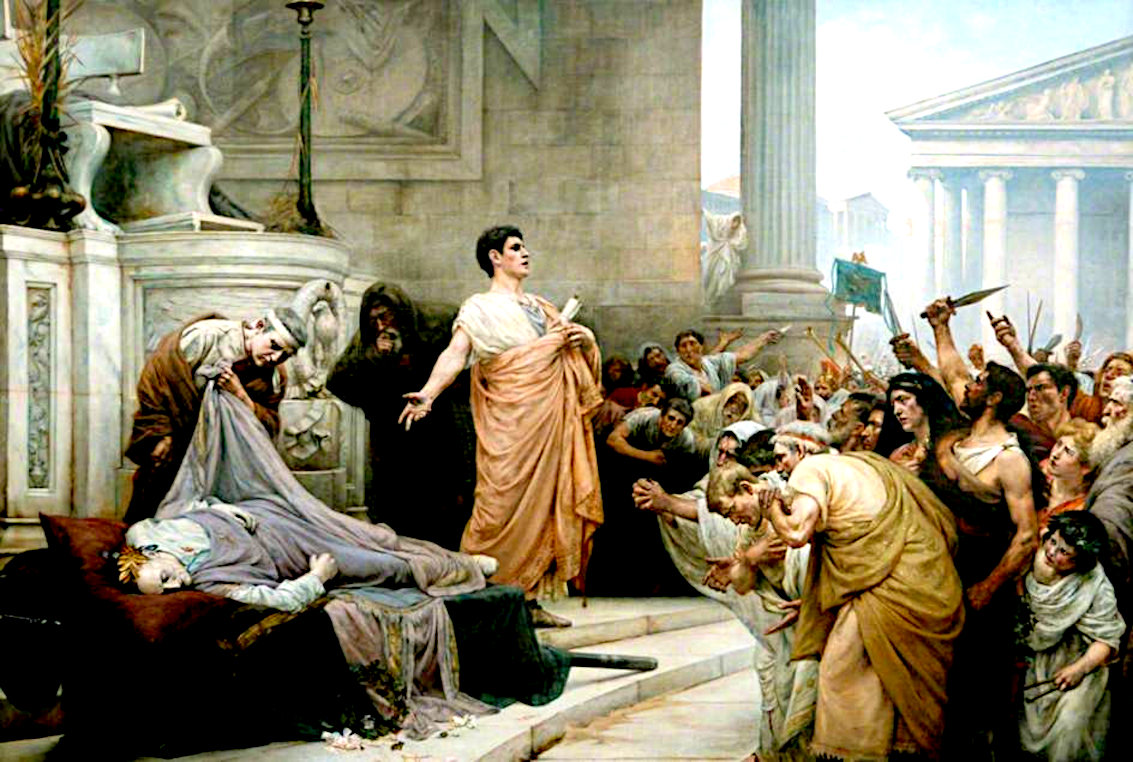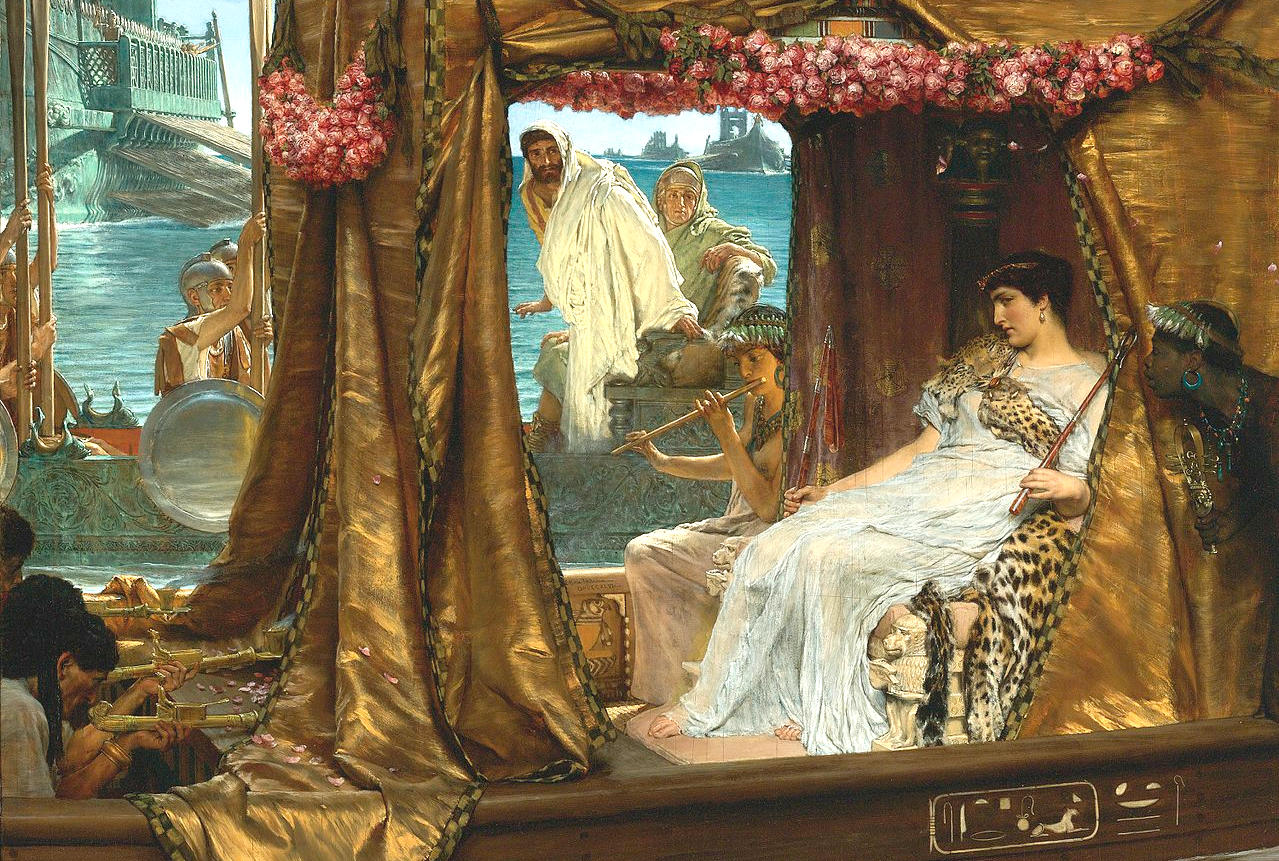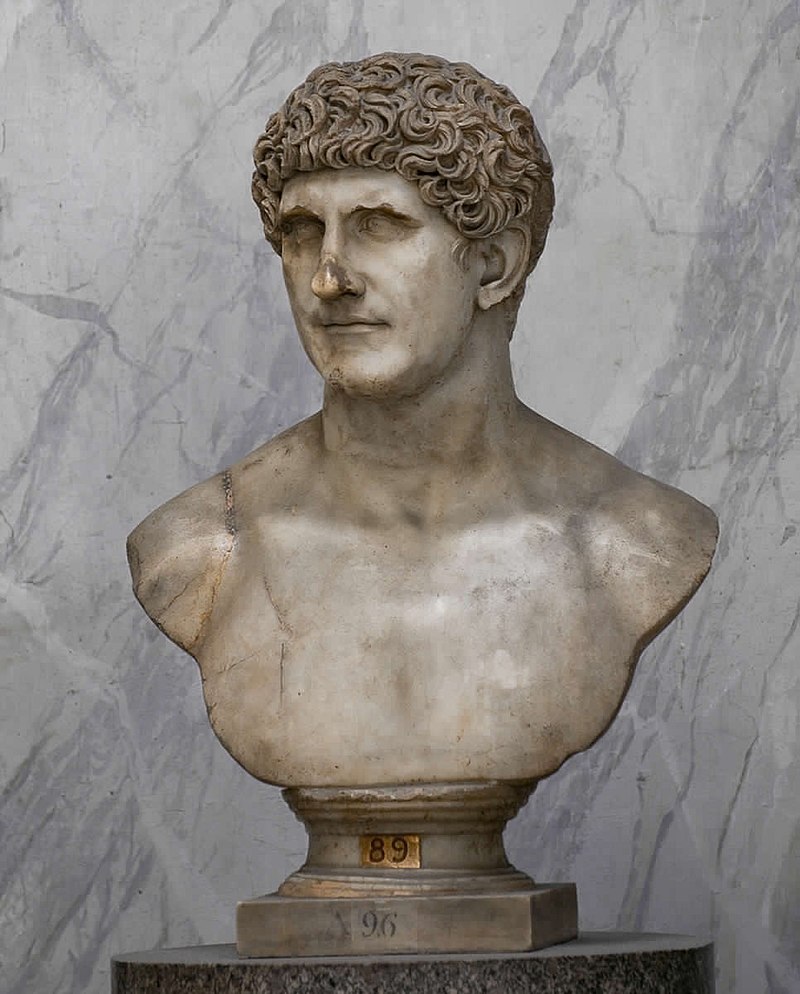
Mark
Antony, at the assassination of Julius Caesar
ROME
& EGYPT
Marcus Antonius (14 January 83 BC – 1 August 30 BC), commonly known in English as
Mark
Antony, was a Roman politician and general who played a critical role in the transformation of the Roman Republic from a constitutional republic into the autocratic Roman Empire.
Antony was a relative and supporter of Julius
Caesar, and served as one of his generals during the conquest of Gaul and the Civil War.
Mark
Antony was appointed administrator of Italy while Caesar eliminated political opponents in
Greece, North
Africa, and
Spain. After Caesar's assassination in 44 BC, Antony joined forces with Marcus Aemilius Lepidus, another of Caesar's generals, and Octavian, Caesar's great-nephew and adopted son, forming a three-man dictatorship known to historians as the Second Triumvirate.
Relations among the triumvirs were strained as the various members sought greater political power. Civil war between Antony and Octavian was averted in 40 BC, when Antony married Octavian's sister, Octavia. Despite this marriage, Antony carried on a love affair with
Cleopatra, who bore him three children, further straining Antony's relations with Octavian.
erupted into civil war in 31 BC, as the Roman Senate, at Octavian's direction, declared war on Cleopatra and proclaimed Antony a traitor. Later that year, Antony was defeated by Octavian's forces at the
Battle of Actium. Antony and Cleopatra fled to Egypt where, having again been defeated at the Battle of Alexandria, they committed
suicide.
With Antony dead, Octavian became the undisputed master of the Roman world. In 27 BC, Octavian was granted the title of Augustus, marking the final stage in the transformation of the Roman Republic into an empire, with himself as the first Roman emperor.

Cleopatra
meets Mark Antony, a womanizer who meets his match
In the turmoil surrounding the assassination, Antony escaped Rome dressed as a slave, fearing Caesar's death would be the start of a bloodbath among his supporters. When this did not occur, he soon returned to Rome. The conspirators, who styled themselves the Liberatores ("The Liberators"), had barricaded themselves on the Capitoline Hill for their own safety. Though they believed Caesar's death would restore the Republic, Caesar had been immensely popular with the Roman middle and lower classes, who became enraged upon learning a small group of aristocrats had killed their champion.
On 19 March, Caesar's will was opened and read. In it, Caesar posthumously adopted his great-nephew Gaius Octavius and named him his principal heir. Then only nineteen years old and stationed with Caesar's army in Macedonia, the youth became a member of Caesar's Julian clan, changing his name to
"Gaius Julius Caesar Octavianus" (Octavian) in accordance with the conventions of Roman adoption. Though not the chief beneficiary, Antony did receive some bequests.
Antony spent the winter of 42 BC in Athens, where he ruled generously towards the Greek cities. A proclaimed philhellene ("Friend of all things Greek"), Antony supported Greek culture to win the loyalty of the inhabitants of the Greek East. He attended religious festivals and ceremonies, including initiation into the Eleusinian Mysteries, a secret cult dedicated to the worship of the goddesses Demeter and Persephone.
In October 41 BC, Antony requested Rome's chief eastern vassal, the queen of Ptolemaic Egypt, Cleopatra, meet him at Tarsus in Cilicia. Antony had first met a young Cleopatra while campaigning in Egypt in 55 BC and again in 48 BC when Caesar had backed her as queen of Egypt over the claims of her half-sister Arsinoe. Cleopatra would bear Caesar a son, Caesarion, in 47 BC and the two living in Rome as Caesar's guests until his assassination in 44 BC. After Caesar's assassination, Cleopatra and Caesarion returned to Egypt, where she named the child as her co-ruler. In 42 BC, the Triumvirate, in recognition for Cleopatra's help towards Publius Cornelius Dolabella in opposition to the Liberators, granted official recognition to Caesarion's position as king of Egypt.
Arriving in Tarsus aboard her magnificent ship, Cleopatra invited Antony to a grand banquet to solidify their alliance. As the most powerful of Rome's eastern vassals, Egypt was indispensable in Rome's planned military invasion of the Parthian Empire. At Cleopatra's request, Antony ordered the execution of Arsinoe, who, though marched in Caesar's triumphal parade in 46 BC, had been granted sanctuary at the temple of Artemis in Ephesus. Antony and Cleopatra then spent the winter of 41 BC together in Alexandria. Cleopatra bore Antony twin children, Alexander Helios and Cleopatra Selene II, in 40 BC, and a third, Ptolemy Philadelphus, in 36 BC. Antony also granted formal control over Cyprus, which had been under Egyptian control since 47 BC during the turmoil of Caesar's civil war, to Cleopatra in 40 BC as a gift for her loyalty to
Rome.
With Egyptian money, Antony invaded Armenia, this time successfully. In the return, a mock Roman triumph was celebrated in the streets of Alexandria. The parade through the city was a pastiche of
Rome's most important military celebration. For the finale, the whole city was summoned to hear a very important political statement. Surrounded by Cleopatra and her children, Antony ended his alliance with
Octavian.
He distributed kingdoms among his children: Alexander Helios was named king of Armenia, Media and Parthia (territories which were not for the most part under the control of Rome), his twin Cleopatra Selene got Cyrenaica and
Libya, and the young Ptolemy Philadelphus was awarded Syria and Cilicia. As for Cleopatra, she was proclaimed Queen of Kings and
Queen of
Egypt, to rule with Caesarion (Ptolemy XV Caesar, son of Cleopatra by Julius Caesar), King of Kings and King of Egypt. Most important of all, Caesarion was declared legitimate son and heir of Caesar. These proclamations were known as the Donations of Alexandria and caused a fatal breach in Antony's relations with Rome.
While the distribution of nations among Cleopatra's children was hardly a conciliatory gesture, it did not pose an immediate threat to Octavian's political position. Far more dangerous was the acknowledgment of Caesarion as legitimate and heir to Caesar's name. Octavian's base of power was his link with Caesar through adoption, which granted him much-needed popularity and loyalty of the legions. To see this convenient situation attacked by a child borne by the richest woman in the world was something Octavian could not accept. The triumvirate expired on the last day of 33 BC and was not renewed. Another civil war was beginning.
During 33 and 32 BC, a propaganda war was fought in the political arena of Rome, with accusations flying between sides. Antony (in Egypt) divorced Octavia and accused
Octavian of being a social upstart, of usurping power, and of forging the adoption papers by Caesar. Octavian responded with treason charges: of illegally keeping provinces that should be given to other men by lots, as was Rome's tradition, and of starting wars against foreign nations (Armenia and Parthia) without the consent of the senate.

Antony was also held responsible for Sextus Pompey's execution without a trial. In 32 BC, the senate deprived him of his powers and declared war against
Cleopatra – not Antony, because Octavian had no wish to advertise his role in perpetuating Rome's internecine bloodshed. Both consuls, Gnaeus
Domitius Ahenobarbus and Gaius Sosius, and a third of the senate abandoned Rome to meet
Antony and Cleopatra in Greece.
In 31 BC, the war started. Octavian's general Marcus Vipsanius Agrippa captured the Greek city and naval port of Methone, loyal to Antony. The enormous popularity of Octavian with the legions secured the defection of the provinces of Cyrenaica and Greece to his side. On 2 September, the naval Battle of Actium took place. Antony and Cleopatra's navy was overwhelmed, and they were forced to escape to Egypt with 60 ships.
Antony was known to have an obsession with women and sex. He had many mistresses (including Cytheris) and was married in succession to Fadia, Antonia, Fulvia, Octavia and Cleopatra. He left a number of children. Through his daughters by Octavia, he would be ancestor to the Roman emperors
Caligula,
Claudius and
Nero.
Through his daughters by Octavia, he was the paternal great grandfather of Roman emperor Caligula, the maternal grandfather of emperor Claudius, and both maternal great-great-grandfather and paternal great-great uncle of the emperor Nero of the Julio-Claudian dynasty. Through his eldest daughter, he was ancestor to the long line of kings and co-rulers of the Bosporan Kingdom, the longest-living Roman client kingdom, as well as the rulers and royalty of several other
Roman client states.
Through his daughter by Cleopatra, Antony was ancestor to the royal family of Mauretania, another Roman client kingdom, while through his sole surviving son Iullus, he was ancestor to several famous Roman statesmen.
The
man certainly got about. In fiction, he is thought to be the ancestor of
John Storm, via Cleopatra
Selene II and Julia
Drusilla Queen of Mauretania.
|



